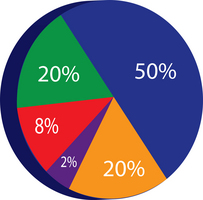 One of the golden rules of investing is to stay ahead of inflation. Most investments are designed to offer returns that will not be eradicated by the average amount of inflation. But there are times when inflation is anything but average. When it is higher than usual, it can eat up the returns on low-interest investments.
One of the golden rules of investing is to stay ahead of inflation. Most investments are designed to offer returns that will not be eradicated by the average amount of inflation. But there are times when inflation is anything but average. When it is higher than usual, it can eat up the returns on low-interest investments.
The variability of inflation is one of the biggest reasons why investors are advised to diversify their portfolios. But in times of high inflation, there are other measures you can take for added protection.
Here are some ideas and advice to consider when inflation is forecasted to rise.
Don’t rule out bonds. While bonds overall tend to perform poorly during increases in inflation, there are some exceptions. Short-term bond funds are good for maintaining liquidity and fare better against inflation than cash investments like money market funds. And Treasury Inflation-Protected Securities, or TIPS, offer the stability of government bonds with built-in inflation protection.
Bank loan funds tend to do well in the face of inflation. That’s because the bank loans to which they’re tied command higher interest rates, and that in turn offers better interest rates to investors. While these funds are a bit risky to invest in heavily, dabbling in them could strengthen your portfolio during periods of high inflation.
Commodities are favorites of many investors looking to beat inflation. Since these investments track changes in the prices of food, energy and raw materials, they naturally perform better when inflation rises. Some investors take advantage of this principle by investing in stocks of commodity companies, but a more direct (and generally more lucrative) approach is to invest in a commodity futures fund.
Do some research on stocks. The variable returns offer the potential to outperform inflation, but there’s also a chance that you could lose money. Consider stocks from companies with low debt to equity ratios for best results.
Take a look at exchange-traded funds. These funds are much like mutual funds, yet they are traded on the stock market. They track indexes such as the S&P 500 and offer plenty of diversification. The best ETFs to invest in during a period of high inflation include those based on energy and metals.
Go international. Other countries may not be experiencing inflation as high as our own, so stocks and bonds based in such countries could perform better. Emerging markets might also benefit from our inflation through commodities exports, so consider investing in those commodities.
Inflation can wreak havoc on our investments. But if you’re proactive, you can greatly reduce your portfolio’s inflation risk. While there’s no point in converting all of your investments into inflation hedges, taking some precautions could certainly pay off.
 One of the golden rules of investing is to stay ahead of inflation. Most investments are designed to offer returns that will not be eradicated by the average amount of inflation. But there are times when inflation is anything but average. When it is higher than usual, it can eat up the returns on low-interest investments.
One of the golden rules of investing is to stay ahead of inflation. Most investments are designed to offer returns that will not be eradicated by the average amount of inflation. But there are times when inflation is anything but average. When it is higher than usual, it can eat up the returns on low-interest investments.



